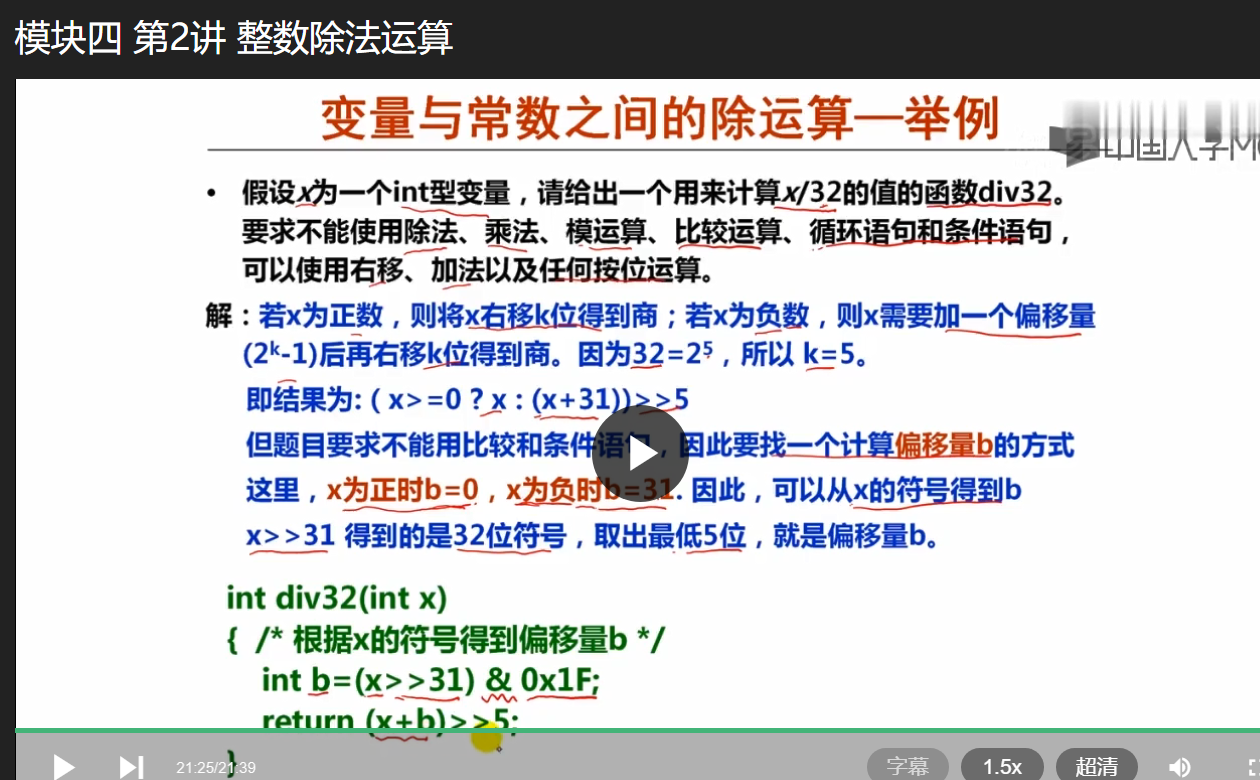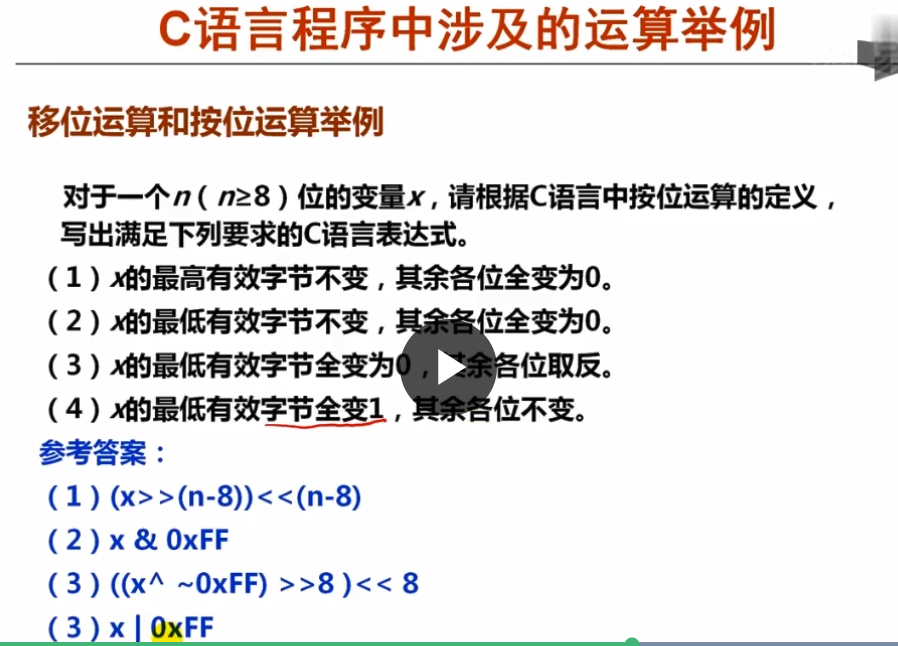位运算_action
计算机系统基础(一):程序的表示、转换与链接-模块四 第2讲 整数除法运算-网易公开课 https://open.163.com/newview/movie/free?pid=WFVPGEQSL&mid=KFVPGF2V4

Bitwise and Bit Shift Operators 位运算 取反 补码
字节 8位
计算机系统基础(一):程序的表示、转换与链接-模块三 第3讲 C语言中的各类运算-网易公开课 https://open.163.com/newview/movie/free?pid=WFVPGEQSL&mid=IFVPGF1U9

原码:符号位0正,1负。
整数x原=
0,x 2^n>x>=0
2^n-x 0>=x>-2^n
正0负0
小数x原=
x 1>x>=0
1-x 0>=x>-1
x为真值
&^ bit clear (AND NOT) integers
https://golang.google.cn/ref/spec#Arithmetic_operators
Go语言的bit clear操作
按位清除
以下摘自The Go Programming Language:
The &^ operator is bit clear (AND NOT): in the expression z = x &^ y, each bit of z is 0 if the corresponding bit of y is 1; otherwise it equals the corresponding bit of x.
即z = x &^ y运算相当于先把y取反(针对y的每个bit:0变成1,1变成0),然后再和x进行&运算。参考下例:
Go语言的bit clear操作 | 我的站点 https://nanxiao.me/golang-bit-clear-operation/
取出 右侧的0位对应的左侧的位的值
#include <stdio.h>
int br(void)
{
printf("\n");
return 0;
}
int main(void)
{
int bit_a = 5;
printf("bit_a & 3 = %d", bit_a & 3);
printf("bit_a | 3 = %d", bit_a | 3);
printf("bit_a ^ 3 = %d", bit_a ^ 3);
br();
// 数字0,8进制
// 位运算,统一转为2进制。
printf("0177 = %d,", 0177);
printf("0177 = %o,", 0177);
printf("bit_a & 0177 = %d,", bit_a & 0177);
br();
printf("bit_a & 0177 = %d", bit_a & 0177);
printf("bit_a | 0177 = %d", bit_a | 0177);
printf("bit_a ^ 0177 = %d", bit_a ^ 0177);
br();
printf("0x0 = %d,", 0x0);
printf("0xf = %d,", 0xf);
// 0x177 1,0111,0111 :5 375 370
printf("bit_a & 0x177 = %d,", bit_a & 0x177);
printf("bit_a | 0x177 = %d,", bit_a | 0x177);
printf("bit_a ^ 0x177 = %d", bit_a ^ 0x177);
br();
// 0177 111,1111 :111,0111 1,0111,1111 1,0000,1000 :119,383,264
printf("0177 & 0x177 = %d,", 0177 & 0x177);
printf("0177 | 0x177 = %d,", 0177 | 0x177);
printf("0177 ^ 0x177 = %d", 0177 ^ 0x177);
br();
printf("bit_a << 3 = %d,", bit_a << 3);
printf("bit_a >> 3 = %d,", bit_a >> 3);
printf("~bit_a = %d", ~bit_a);
br();
return 0;
}
bit_a & 3 = 1bit_a | 3 = 7bit_a ^ 3 = 6 0177 = 127,0177 = 177,bit_a & 0177 = 5, bit_a & 0177 = 5bit_a | 0177 = 127bit_a ^ 0177 = 122 0x0 = 0,0xf = 15,bit_a & 0x177 = 5,bit_a | 0x177 = 375,bit_a ^ 0x177 = 370 0177 & 0x177 = 119,0177 | 0x177 = 383,0177 ^ 0x177 = 264 bit_a << 3 = 40,bit_a >> 3 = 0,~bit_a = -6
Bitwise and Bit Shift Operators (The Java™ Tutorials > Learning the Java Language > Language Basics) https://docs.oracle.com/javase/tutorial/java/nutsandbolts/op3.html
Bitwise and Bit Shift Operators
The Java programming language also provides operators that perform bitwise and bit shift operations on integral types. The operators discussed in this section are less commonly used. Therefore, their coverage is brief; the intent is to simply make you aware that these operators exist.
The unary bitwise complement operator "~" inverts a bit pattern; it can be applied to any of the integral types, making every "0" a "1" and every "1" a "0". For example, a byte contains 8 bits; applying this operator to a value whose bit pattern is "00000000" would change its pattern to "11111111".
The signed left shift operator "<<" shifts a bit pattern to the left, and the signed right shift operator ">>" shifts a bit pattern to the right. The bit pattern is given by the left-hand operand, and the number of positions to shift by the right-hand operand. The unsigned right shift operator ">>>" shifts a zero into the leftmost position, while the leftmost position after ">>" depends on sign extension.
The bitwise & operator performs a bitwise AND operation.
The bitwise ^ operator performs a bitwise exclusive OR operation.
The bitwise | operator performs a bitwise inclusive OR operation.
The following program, BitDemo, uses the bitwise AND operator to print the number "2" to standard output.
class BitDemo {
public static void main(String[] args) {
int bitmask = 0x000F;
int val = 0x2222;
// prints "2"
System.out.println(val & bitmask);
}
}
位运算
https://baike.baidu.com/item/取反/12718166?fr=aladdin
运算方法
正数取反
负数取反
简便方法
int bitmask = 0x000F; //15 1111
int val = 0x22; //2*(16^2-1)/15=16*2+2=34 11111+11=100010
System.out.println(val);
System.out.println(bitmask);
System.out.println(~val);
System.out.println(~bitmask);
System.out.println(val & bitmask);// a bitwise AND operation // 10 2
System.out.println(val ^ bitmask);// a bitwise exclusive OR operation // 101101 45
System.out.println(val | bitmask);// a bitwise inclusive OR operation // 101111 47
Bitwise and Bit Shift Operators 位运算 取反 补码
异或 XOR ^
满足交换律、结合律
n^n=0
n^0=n
x^y^y=x
【技巧总结】位运算 -CSDN博客 https://blog.csdn.net/m0_37907797/article/details/103120886
1、一组数,除去唯一的一个数外,其他数重复出现偶数次,查出该数,要求时间复杂度O(n),空间复杂度O(1)实现
x=a1^a2...ai...an
2、不引入第三个数,交换两个数
x=x ^ y
y=x ^ y=x0^y0^y0=x0
x=x ^ y
=(x0^y0)^((x0^y0)^y0)
=y0
且运算
x&1=1 等价于x为素数 判断奇偶数
移位运算
幂运算 求m的n次方,常规做法时间复杂度O(n)
异或运算 交换两个数 位运算 空间复杂度O(1)
如何优雅地运用位运算实现产品需求? | 梁桂钊的博客 http://blog.720ui.com/2020/bitdesign/
leetcode https://blog.csdn.net/holmofy/article/details/79360859
Bit Twiddling Hacks http://graphics.stanford.edu/~seander/bithacks.html
被3整除
(n-3) & 0x3 == 0
每个3纳秒 time.Now().UnixNano() & 0x3 == 0


 浙公网安备 33010602011771号
浙公网安备 33010602011771号